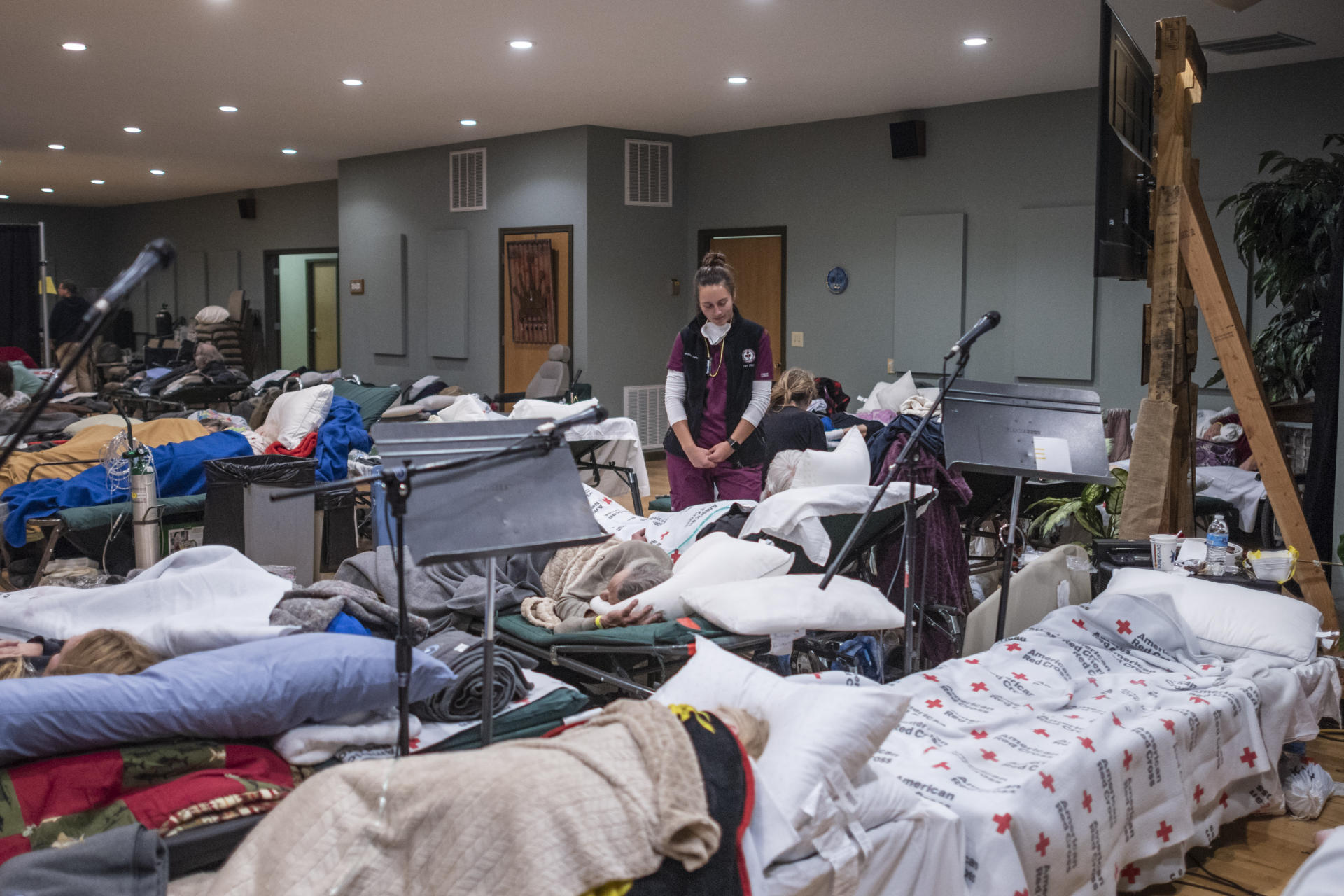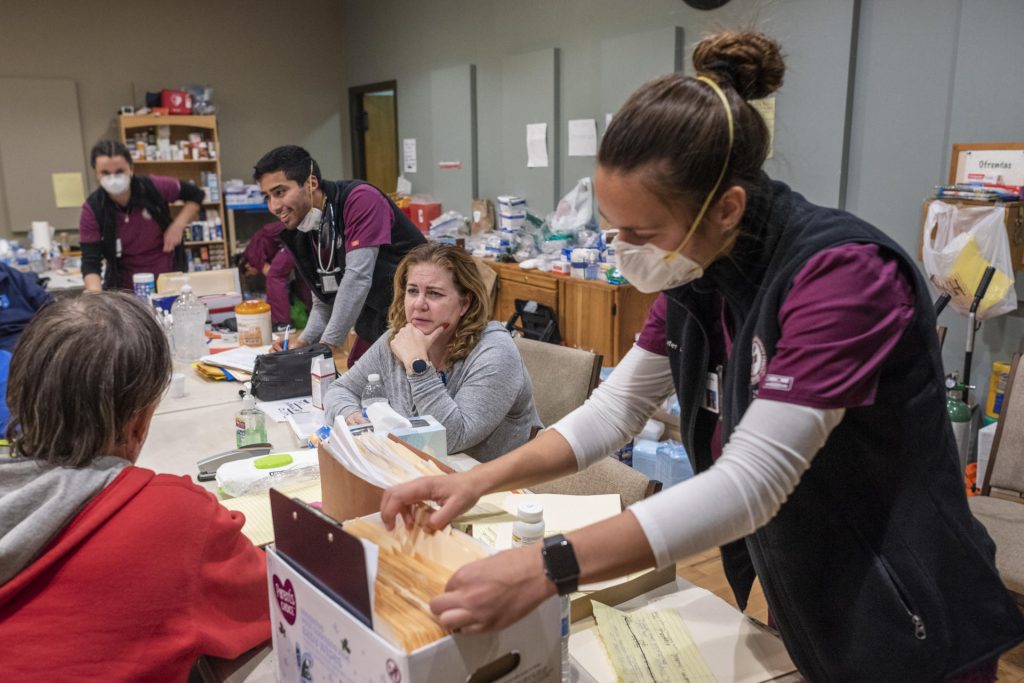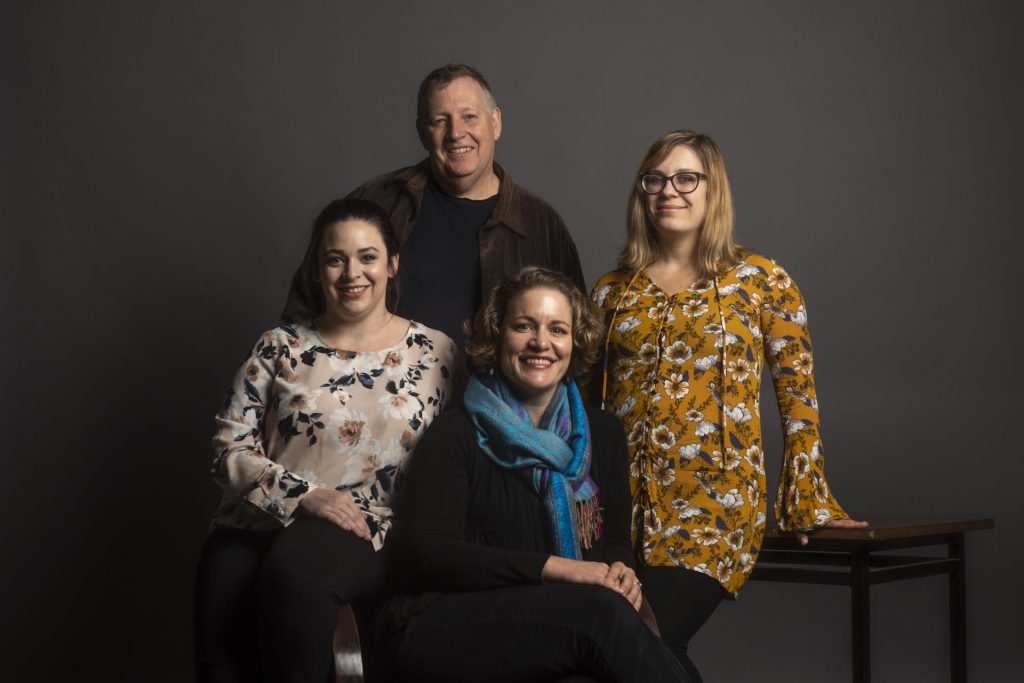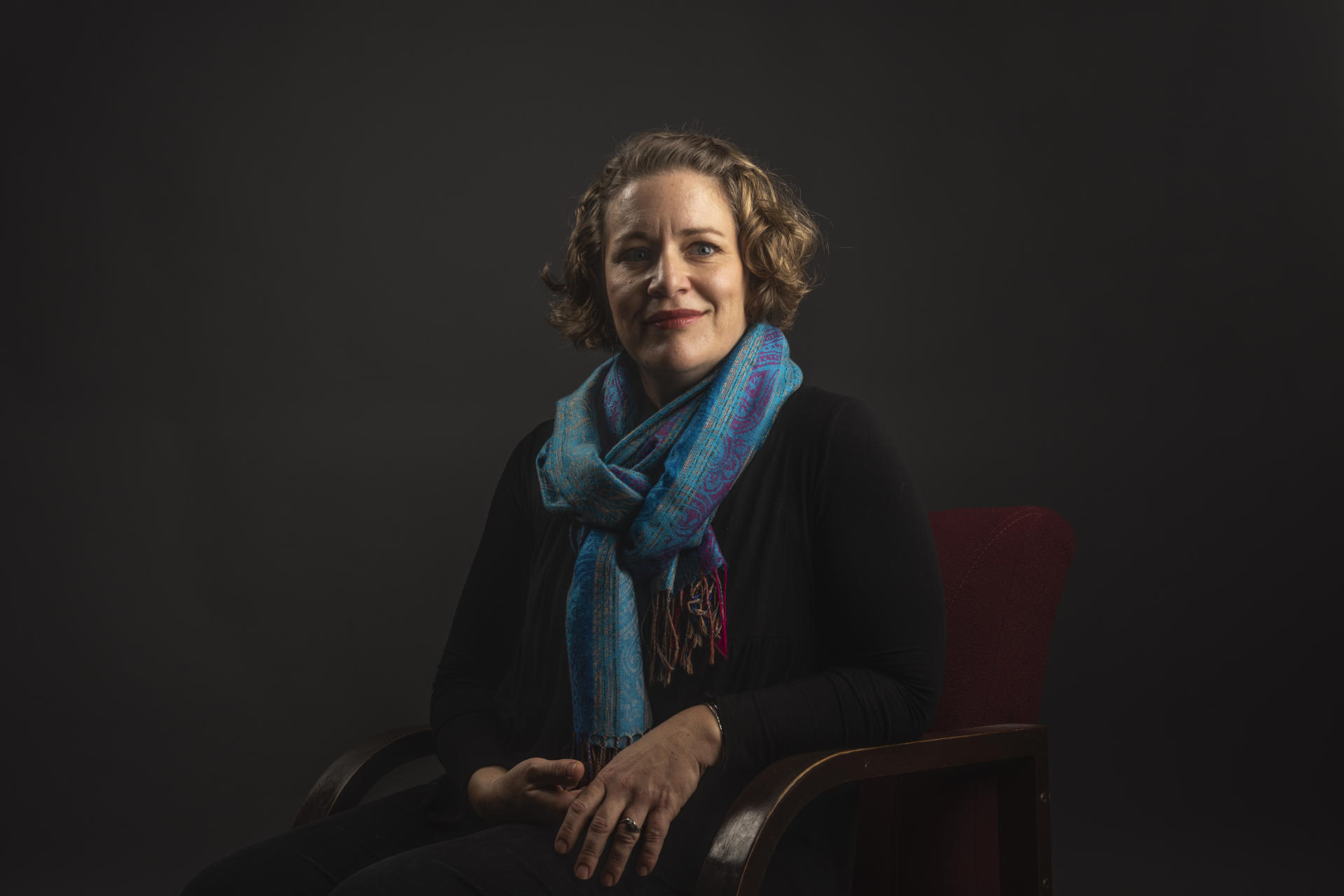Students Care for Evacuees’ Physical and Mental Wellness

Nursing student Jennifer Lefort (center) talks with an evacuee patient as they work in the clinic set up at the evacuation center at Neighborhood Church, as the Camp Fire continues to impact the air quality and community on Saturday, November 10, 2018 in Chico, Calif. (Jason Halley/University Photographer/CSU Chico)
Dozens of cots lined the church gymnasium in tidy rows, a stark contrast to the chaos from which Camp Fire evacuees fled. Every face reflected the effects of exhaustion mixed with terror, the air of uncertainty as thick as the smoke outside.
Anna Lee was careful to visit as many evacuees as she could. She was one of many Chico State Marriage and Family Therapy (MFT) graduate students and School of Nursing students who mobilized to support Camp Fire evacuees’ mental and physical wellness as the need to provide a wide range of care became abundantly clear.
The vast majority of evacuees were tired of talking and rehashing the horror. Some were approaching the mental breaking point of being cooped up with nowhere else to go, and others expressed suicidal ideation. After counseling those she could, Lee turned to other simple yet important tasks. She walked dogs, made pharmacy runs, and fed children dinner so parents could take 30 minutes to talk about what lay ahead.
“I hope people realize that you don’t need to be in an MFT program or have initials after your name to be useful during this time,” she said. “You have to be a human being that cares, you need to be able to listen, you need to be able to make eye contact, and you need to be able to provide empathy and understanding.”
The instant exodus from hills of Butte County following the deadliest and most destructive fire in state history exposed many of the area’s most vulnerable of residents, including older adults with mobility issues, those who were being medically treated at the time of the evacuation, and those without a support network or economic means for temporary housing.
Mobilized by Butte County Public Health, Chico State nursing students arrived at another evacuation shelter across town and began pulling tables from storage spaces to create triage counters for the hundreds of patients they would soon have. They also helped haul in skilled nursing equipment and other supplies being unloaded in the parking lot.

Nursing student Derek Reichel, who expects to graduate this month, helped address basic needs with primary healthcare, triaging and taking vitals, and addressing immediate medication essentials.
“A lot of people just had to leave [Paradise], and they left their pill boxes at home,” Reichel recalled. “The first couple of days we were doing medication reconciliation and finding out where to fill prescriptions for medications from other places.”
As the shelter shrank from around 600 evacuees to about 300 within the first few days, the students continued treating patients and streamlining operations. Reichel, a former Marine who served from 2008 to 2012, helped establish isolation rooms inside the church to limit the spread of norovirus while supporting other needs as they arose.
One night, a shelter security officer reported finding a woman lying inside her van in the parking lot. Overnight temperatures in Chico had dipped to near freezing, so Reichel joined other nursing students and a nursing instructor to inspect.
“It turns out she had late-stage dementia, and she wasn’t really sure what was going on,” Reichel said. “We don’t know how long she’d been in there.”
The woman was lying awake with no heat, and her only source of warmth were her two black Labrador retrievers huddled on either side of her. After assessing the woman, it was clear she needed additional care, so she and the dogs were driven to a nearby Red Cross shelter.
“I highly suspect that if those dogs weren’t keeping her warm, she probably would have died,” he said. “She was about 200 feet from the evacuation center.”
The nursing students, who had been scheduled for a disaster preparedness simulation the following week, found themselves immersed in a real-world scenario while also collaborating with other agencies. It wasn’t uncommon, Reichel said, for licensed nurses and physicians to ask the students for direction on what to do.
“I’m a student in scrubs that say Chico State… This is the first event where being a student didn’t really matter as much,” he said. “It actually made me feel like a real nurse for the first time.”
And the general and varied nature of the work Reichel did put what he’d learned to this point into perspective.
“It’s not just passing medications or doing procedures,” Reichel said. “It’s being there and listening to people.”

The MFT students also did their best to provide hope in an otherwise overwhelmingly difficult situation.
“When I was there, I was just tuning in to people,” Lee said, “being there as a human being, providing eye contact and empathy, letting them know any feelings they have are normal.”
“It was like we were first responders for emotional support,” added MFT graduate student Victoria Burke.
This support could mean digging through mounds of donated clothes in search of a single shirt to fit an exhausted evacuee, driving someone to a pharmacy to fill a much-needed prescription, and cleaning cat litter boxes.
As the days crept by, Lee noted evacuees grew increasingly agitated, asking when and where they could go, as the close quarters were beginning to fray at nerves of many who were so used to living in more isolated situations.
“Let’s face it, if they had somewhere else to go, they would be there,” Lee said.
Acknowledging and understanding that framework sometimes meant pulling aside someone who was disrupting others and walking around the block with them, or driving around town just so they could vent.
MFT graduate student Inna Lukyanov walked around the shelter checking in with evacuees and asking if they needed anything, whether a bottle of water or navigating smartphones provided by Verizon and T-Mobile so they could connect with loved ones, often checking in for the first time since leaving Paradise.
“A lot of them had never used a smartphone before,” she said. “I showed them how to text their children, make calls, and turn the volume up and down.”
And yet, in the face of their own despair, Lukyanov noticed many evacuees expressing concern about their neighbors, asking about an elderly couple down the street, or following up on friends they weren’t able to check in with before they fled.
“It shows humans are caring creatures in a way you don’t always see in day-to-day life,” she said.

As the Camp Fire and its fallout are inevitably replaced by new headlines, the students agree the need to address and help the physical and psychological well-being of evacuees will remain for the foreseeable future.
“It doesn’t just stop here because school’s back in session. It doesn’t stop here because the news doesn’t talk about it,” Burke said. “The need will be here for many months, if not years, to come.”
“I think we’re all realizing that our work is just beginning,” Lee said.


